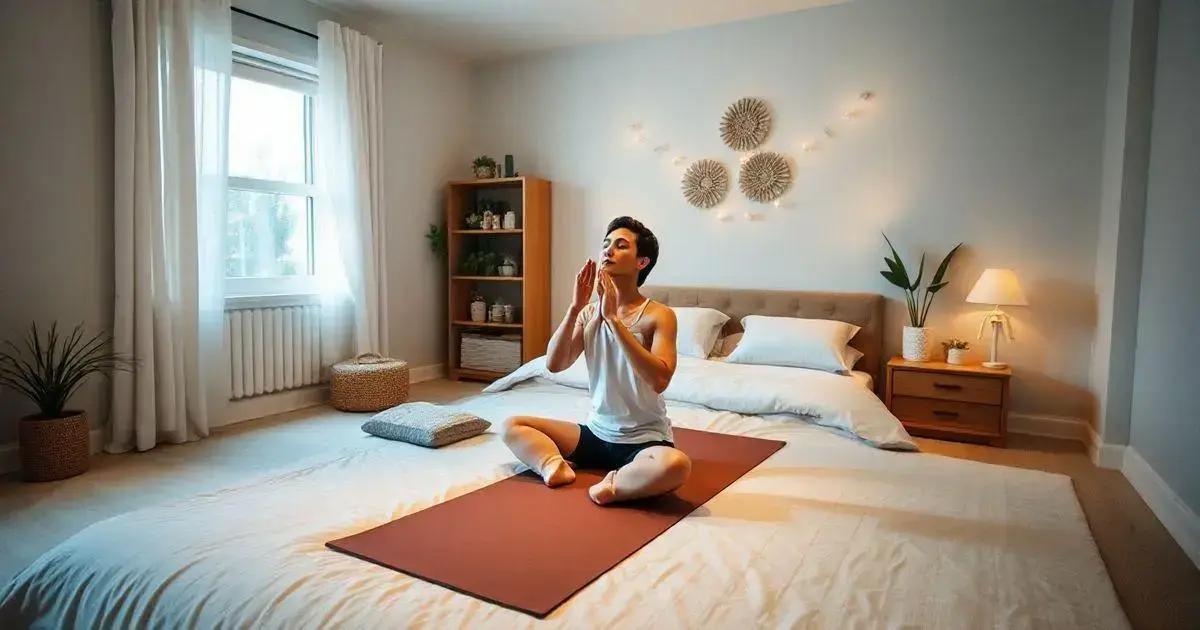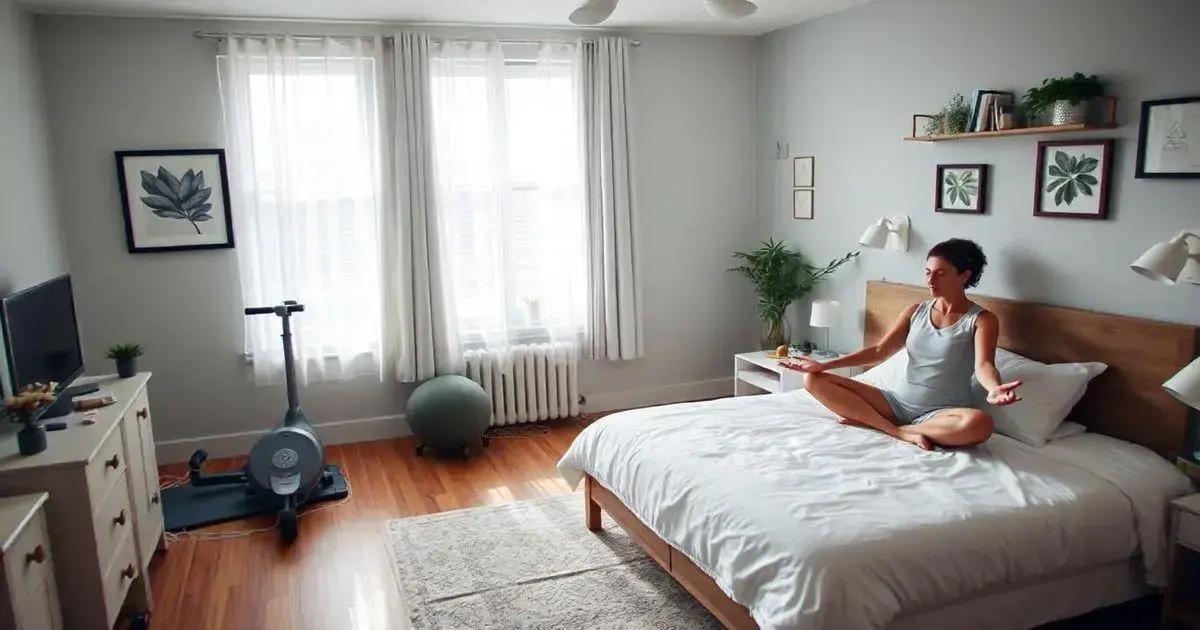To prevent insomnia through better nighttime habits, establish a consistent sleep routine, practice relaxation techniques, make lifestyle changes such as regular exercise, and create a comfortable sleep environment, ensuring you prioritize your well-being for improved sleep quality.
Insomnia can greatly affect your quality of life, making it essential to understand how to prevent it through better nighttime habits. By establishing a consistent sleep routine and employing effective relaxation techniques, you can combat sleepless nights. This article will explore the causes of insomnia and provide practical tips to improve your sleep, ensuring you wake up refreshed and ready to tackle the day.
Understanding Insomnia and Its Causes

Insomnia is a common sleep disorder that affects millions of people around the world. It can make it hard to fall asleep, stay asleep, or wake up too early and not be able to go back to sleep. Understanding insomnia and its causes is important for finding ways to prevent it through better nighttime habits.
What Causes Insomnia?
There are many factors that can lead to insomnia. Stress and anxiety are major contributors. When we worry or feel overwhelmed, it can be difficult to relax and drift off to sleep. Certain medications, health conditions, and lifestyle choices can also play a role.
Common Factors Influencing Insomnia
Some common factors that influence insomnia include:
- Poor sleep habits: Having an irregular sleep schedule can confuse your body’s internal clock.
- Caffeine and nicotine: Consuming these stimulants, especially in the afternoon or evening, can make it hard to sleep.
- Environment: A noisy or uncomfortable sleeping environment can disrupt your sleep.
- Medical conditions: Chronic pain, asthma, and other health issues can interfere with sleep.
Emotional and Psychological Factors
Emotional issues such as depression and anxiety can significantly impact your ability to sleep. When your mind is racing or preoccupied with worries, sleep becomes elusive. Recognizing these emotional triggers is a step toward better sleep.
Identifying Your Insomnia Triggers
To determine what causes your insomnia, keep a sleep diary. Record when you go to bed, when you wake up, your daily habits, and any factors affecting your sleep. This can help you and your healthcare provider pinpoint specific issues that may be contributing to your insomnia.
The Importance of a Sleep Routine

Having a consistent sleep routine is crucial for preventing insomnia and promoting better sleep quality. By going to bed and waking up at the same time each day, you help regulate your body’s internal clock. This regulation makes it easier to fall asleep and wake up naturally, without feeling groggy.
Benefits of a Sleep Routine
A well-established sleep routine has multiple benefits:
- Improved Sleep Quality: Consistency in timing helps enhance deep sleep, which is essential for feeling rested.
- Reduced Insomnia Symptoms: A regular schedule can decrease the chances of experiencing insomnia or other sleep disorders.
- Better Mental Health: A solid sleep pattern is linked to improved mood and cognitive functioning.
Tips to Establish a Sleep Routine
Here are some helpful tips to create a sleep routine:
- Set a Sleep Schedule: Choose a bedtime and wake-up time, and try to stick with it, even on weekends.
- Create a Relaxing Pre-Sleep Ritual: Engage in calming activities like reading or taking a warm bath before bed.
- Avoid Screens: Limit exposure to screens at least one hour before bedtime, as blue light can disrupt melatonin production.
Adjusting Your Sleep Environment
Your sleep environment can significantly impact your routine. Make sure your bedroom is dark, quiet, and cool. Using comfortable bedding and pillows can also enhance your sleeping experience.
Being Flexible and Patient
Everyone’s sleep needs are different, so it might take time to find the best routine for you. Be patient and flexible as you adjust your sleep habits, and your body will reward you with better rest.
Techniques for Relaxation Before Bed

Incorporating relaxation techniques before bed can significantly enhance your ability to fall asleep. These simple methods help calm your mind and prepare your body for a restful night. Here are some effective techniques to consider:
1. Deep Breathing Exercises
Deep breathing is a great way to reduce stress. Inhale slowly through your nose, filling your lungs. Then exhale gently through your mouth. Repeat this process for several minutes.
2. Progressive Muscle Relaxation
This technique involves tensing and then relaxing each muscle group in your body. Start from your toes and work up to your head. This helps release physical tension and promote relaxation.
3. Meditation and Mindfulness
Meditation helps clear your mind of distractions. You can use guided meditation apps or simply focus on your breath. Even a few minutes can make a big difference.
4. Aromatherapy
Using calming scents such as lavender or chamomile can create a soothing atmosphere. Consider using essential oils in a diffuser or applying diluted oil to your skin before bed.
5. Gentle Stretching or Yoga
Gentle stretches or yoga before bed can help release tension in your muscles. Focus on slow, gentle movements that relax your body while calming your mind.
6. Reading a Book
Reading a physical book (not on a screen!) can help shift your attention away from daily stresses. Choose something enjoyable and relaxing to help ease you into sleep.
7. Listening to Soft Music or Nature Sounds
Calming music or nature sounds can create a tranquil environment. Consider creating a playlist of your favorite relaxing tracks to listen to as you wind down.
Lifestyle Changes for Better Sleep Quality

Making lifestyle changes can greatly improve your sleep quality. Here are some effective strategies to consider for better sleep:
1. Regular Exercise
Engaging in physical activity during the day can help you fall asleep faster. Aim for at least 30 minutes of moderate exercise most days. However, avoid intense workouts close to bedtime as it may energize you.
2. Limit Caffeine and Nicotine
Both caffeine and nicotine are stimulants that can disrupt your sleep. Try to avoid consuming them at least 4-6 hours before bedtime. Instead, consider herbal teas that promote relaxation.
3. Manage Stress and Anxiety
Coping with daily stress through positive strategies is essential. Activities like journaling, mindfulness, or talking with a friend can help ease anxiety and lead to better sleep.
4. Create a Comfortable Sleep Environment
Make your bedroom a sanctuary for sleep. Keep it dark, quiet, and at a cool temperature. Invest in a comfortable mattress and pillows that support your sleeping style.
5. Avoid Heavy Meals Before Bed
Eating a big meal right before bed can lead to discomfort and indigestion. Try to finish eating at least 2-3 hours before you go to sleep. If you’re hungry, opt for a light snack.
6. Limit Daytime Naps
If you struggle to fall asleep at night, avoid long daytime naps. If you must nap, keep it short (20-30 minutes) and try to do so earlier in the day.
7. Maintain a Sleep Schedule
Going to bed and waking up at the same time every day helps regulate your body’s internal clock. Consistency reinforces your sleep-wake cycle, making it easier to fall asleep and wake up.
Take Charge of Your Sleep for Better Health
By implementing the strategies discussed in this article, such as understanding insomnia, establishing a sleep routine, practicing relaxation techniques, and making lifestyle changes, you can significantly improve your sleep quality.
Creating an environment that promotes restful sleep and prioritizing your nighttime habits will help you combat insomnia and enjoy deeper, more restorative sleep.
Remember, making gradual adjustments can lead to remarkable improvements in your sleep health. Embrace these tips, and take positive steps toward enhancing your overall well-being.
FAQ – Frequently Asked Questions about Preventing Insomnia
What is insomnia and how can I prevent it?
Insomnia is a sleep disorder that makes it hard to fall asleep or stay asleep. You can prevent it by establishing a sleep routine, managing stress, and creating a comfortable sleep environment.
What are some techniques for relaxation before bed?
Some effective relaxation techniques include deep breathing exercises, progressive muscle relaxation, meditation, and gentle stretching or yoga.
How does regular exercise affect sleep quality?
Regular exercise can help you fall asleep faster and improve sleep quality. Aim for at least 30 minutes of moderate exercise most days.
Why is it important to have a consistent sleep schedule?
A consistent sleep schedule helps regulate your body’s internal clock, making it easier to fall asleep and wake up naturally, which enhances overall sleep quality.
What lifestyle changes can improve my sleep quality?
Lifestyle changes include limiting caffeine and nicotine, managing stress, creating a comfortable sleep environment, and avoiding heavy meals before bed.
How can I create a better sleep environment?
To create a better sleep environment, keep your bedroom dark, quiet, and cool. Use comfortable bedding, and remove distractions like electronics.













